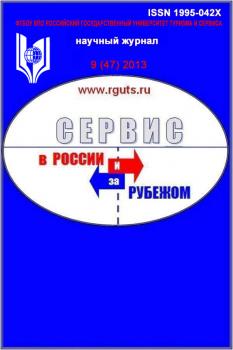The article focuses on the implementation of a practice-oriented education in Bachelor’s and Master´s programmes in tourism in P.G. Demidov Yaroslavl State University. These requirements are set by the Federal State Educational Standard 3 and 3+ and are dictated by the real labor market. The practice-oriented approach is achieved through the applying of interactive training forms, involving of experts in tourism industry, organization of various kinds of practices associated with real activity, realization training trips and extracurricular students’ activities. An important factor of increasing the connection of the educational process with the actual needs of the tourism business is the formulation of final results in the form of specific professions. This approach allows organizing training modules in accordance with the tourist industry requirements. An important form of the formation of business thinking in students, who are studying tourism, is their work at workshops on the development of specific programs or objects by request the municipal or commercial establishments. In contrast to the bachelor degree course for master course at the Yaroslavl State University are formulated professional guidelines relating to the enterprise management in the tourism industry, territory management, as well as the development of territorial tourism and recreation complexes. The high demand of the University graduates at the enterprises of the tourism industry proves the success of this approach in the educational field.
Educational Standard, practice-oriented approach, professional skills formation
1. Vetrov Yu., Klushina N. Praktiko-orientirovannyy podkhod. Vysshee obrazovanie v Rossii. - 2002. - Vyp.6. - S. 43-46.
2. Gor´kanova L.V. Modul´noe obuchenie kak pedagogicheskaya tekhnologiya, ispol´zuemaya pri praktiko-orientirovannoy podgotovke kadrov industrii turizma. Materialy mezhdunarodnoy konferentsii Orenburgskogo gosudarstvennogo universiteta. [Elektronnyy resurs]: URL: http://conference.osu.ru/assets/files/conf_info/conf6/17.pdf (data obrashcheniya: 12.11.2015).
3. Dzhandzhugazova E.A., Agamirova E.V. Praktiko-orientirovannoe obuchenie kak klyuchevoy faktor razvitiya obrazovaniya v sfere servisa i turizma. Sovremennye problemy servisa i turizma. - 2010. - №1. - S. 80-83.
4. Egoshina N.M. Formirovanie professional´no vazhnykh kachestv studentov v uchebnom proektirovanii: na primere turistskogo vuza: dis.... kand. pedagog. nauk: 13.00.01. - M., 2005. - 237 s.
5. Karyukina O.A. Praktiko-orientirovannyy podkhod v podgotovke spetsialistov. [Elektronnyy resurs]: URL: http://nsportal.ru/npo-spo/obrazovanie-i-pedagogika/library/2014/11/16/praktiko-orientirovannyy-podkhod-v-podgotovke (data obrashcheniya: 12.11.2015).
6. Sakharchuk E.S. Analiz zarubezhnykh modeley podgotovki kadrov dlya sfery turizma: monografiya / E.S. Sakharchuk. - M.: izd-vo «Rusayns», 2015. - 164 s.
7. Skamnitskiy A.A. Modul´no-kompetentnostnyy podkhod i ego realizatsiya v srednem professional´nom obrazovanii. - M., 2006. - 247 s.
8. Solyankina L.E. Model´ razvitiya professional´noy kompetentnosti v praktiko-orientirovannoy obrazovatel´noy srede. Izvestiya VGPU. - 2011. - № 1.
9. Yalalov F.G. Deyatel´nostno-kompetentnostnyy podkhod k praktiko-orientirovannomu obrazovaniyu. Eydos. [Elektronnyy resurs]: URL: http://www.eidos.ru/journal/2007/0115-2.htm (data obrashcheniya: 07.10.2015).
10. Yalalov F.G. Professional´naya mnogomernost´: mnogomernye kompetentsii. Filologiya i kul´tura. - 2015. - № 2. - S. 326-330.





